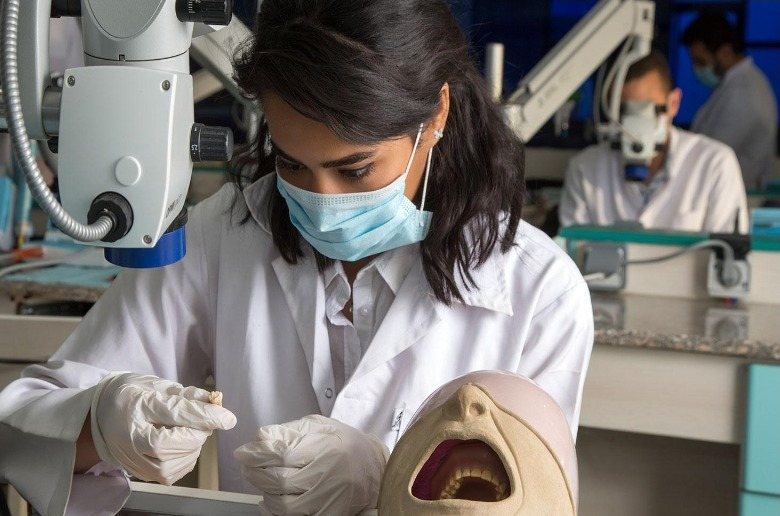

Education
10 Reasons Why School Needs an MDM Solution
Education provisioning has undergone significant changes over the past two decades. Today students have access to a wide array of portable devices including smartphones, tablets, laptops, etc. The ubiquity of these mobile devices is becoming prevalent on almost every educational campus and even in some classrooms across the globe.
While schools that allow the bringing of mobile phones in the campuses without drafting the usage terms and regulations, often encounter challenges in enforcing the policies concerning user privacy and security. To remain competitive in this ever-changing economy, educational institutions need to remain abreast of innovative strategies and approaches to create an immersive learning experience for students no matter where they are. Schools all over the world are implementing digital pedagogy to enlighten students about the concept and implementation of shared devices, 1:1 programs, and Bring-your-own-devices (BYOD) programs.
An effective mobile learning strategy can, however, be challenging. Mobile devices used by students for educational purposes require monitoring, administration, and security measures. Unfortunately, many schools find it hard to manage, monitor, and maintain a multitude of mobile devices used by the students no matter if it is driven by Bring-your-own device policy or institutional-owned deployment.
As a result of these challenges, it becomes imperative for educational institutions to find better ways to manage their device fleets. Therefore, they resort to MDM solutions.
What is MDM, and how does it work?
MDM or Mobile Device Management is the amalgamation of tools, technology, and processes that enhances the security of an organization’s assets by allowing the IT admins to monitor, administer and secure technological devices such as laptops, phones, tablets, and other end-points.
With the solution of MDM, the IT admins in any enterprise can gain remote access to control the managed endpoints. IT admins can deploy, authorize and administer a predetermined set of security policies to seamlessly secure their critical data on a given network (e.g., a school’s network).
An MDM solution leverages a client-server architecture. In its simplest form, these devices mentioned act as clients while the MDM server remotely administers settings, apps, and policies using over-the-air (OTA) programming and updates.
Why Do Schools Need MDM Solutions?
As mobile devices become more prevalent in the educational curriculum, it poses a double-edged sword as the utilization of mobile devices allows educational institutions to expand their classrooms. But, this also opens gates of exposure to several potential vulnerabilities on online networks and can offer students opportunities to access inappropriate content online under unmanaged circumstances.
We have compiled ten reasons why schools need a reliable Mobile Device Management solution more than ever today.
1. Single console to manage all your devices
The current generation of school children is digital natives. Even before they start going to school, children are already exposed to mobile phones, apps, and online tools. With technology all around them, they become accustomed to it. The digitized educational system is appealing to them, and they are eager to use mobile devices and apps in classrooms.
Therefore, it is prudent for educators to adopt, implement and utilize new technologies to create immersive learning experiences without worrying about data security. It can sometimes become cumbersome to hover through the internet in search of a reliable technological solution to invest in. What if you could manage all the mobile devices from a single dashboard? An MDM solution empowers the educational institutes to manage Chromebooks, Android, iOS MDM, and macOS devices from a single dashboard.
2. Ensure a distraction-free learning
Mobile devices can be a huge distraction for students. This is one of the most common concerns of educators and parents. Rather than being simply allegations, these concerns are substantiated by facts.
The average American adult checks their phone 160 times per day as per statistics. What about the younger generation?
Another study displayed that 92% of students send text messages while spending their day at school.
As natural as it may seem, the effectiveness of the studying process decreases when students are more focused on their cell phones instead of the instructions they are receiving from the educators. Information acquisition is reduced, and students’ grades suffer.
The purpose of MDM for schools is to remedy this problem. By implementing innovative MDM solutions, IT administrators can impose access restrictions on entertainment apps, gaming websites, social media platforms, and messengers. That’s a great way to ensure that mobile devices are only used for educational purposes without being a route of distraction for students.
3. Block access to inappropriate online content
The internet contains a large amount of inappropriate content, including games, gambling, pornography, and potential abuse. More than ever, children and youth are at risk of being exposed to violent content, gender stereotypes, and explicit sexual content. Psychologists warn that such materials can lead to a distorted worldview, increase risky behaviors, and impair a child’s ability to form and sustain successful relationships with others as per a study.
Adults must minimize children’s exposure to unwanted substances. Teachers are responsible for protecting their students in school as much as parents are at home. It becomes mandatory for IT admins to deploy MDM solutions and blacklist inappropriate websites to safeguard students against harmful content on the web
4. Minimize the number of potential network vulnerabilities
Schools lack adequate protection for their networks. Why? Number one is the sheer number of users and devices in the network. The second reason is that the users (children) lack the knowledge on how to behave on the Internet. Their knowledge of cybersecurity is either scant or nonexistent, and they have no clue what malware or phishing emails are.
The need for MDM in schools is also driven by the need for cybersecurity. MDM solutions enable students and teachers to use their personal devices without endangering their schools’ networks. With a mobile device management solution, schools can safeguard the fleet of mobile devices being used in the schools from malware, phishing, and intellectual property theft (like compromise or leakage of research papers, essays, lessons, etc.)
MDM simplifies the enforcement of security measures like encryption, app updates, and data backup from an IT standpoint. Furthermore, Remote wiping ensures the safe removal of private and proprietary data in case of theft or loss of devices. The combination of these features minimizes the likelihood of data theft and ensures fast restoration of critical data in the event of loss or compromise.
5. Ensure secure distance learning
The use of MDM at schools has another benefit: it helps to prevent “Zoop bombings” and “Zoom raids”. The cyberattack that happens on platforms like Zoom, which uses video conferencing.
These are recent incidents that are worth mentioning:
One hacker in Schuylkill County, Pennsylvania, cursed at children and screamed racial slurs during kindergarten orientation.
At Columbus, Georgia, Zoom bombers disrupted a middle school’s online class by using pornography.
When schools are being conducted remotely, educators can still utilize MDM solutions for the enhancement of mobile device security. MDM solutions for schools can drastically contribute to improve the quality of distance learning and assure system stability.
6. Improve and secure classroom communication
With a mobile device management solution, teachers can push educational documents onto students’ mobile devices via the remote content collaboration feature. Learning materials and documents can be delivered directly to students’ devices by the educators so that the additional efforts of students for searching the web and downloading necessary information modules can be avoided.
Schools can also use MDM to facilitate collaboration. Students can exchange documents, images, and presentations safely in a controlled manner such as imposing restrictions to only use native mobile apps for students identity authentication and the usage of cloud, etc. There are minimal chances that students will share malicious files with other students. So, students will not be exposed to the possibility of visiting a scam website and clicking an embedded malicious link.
7. Enable mobile Wi-Fi hotspots via Android phones
Although distance learning is becoming more common across the world, some of the students residing in rural areas still face network connection issues when attending online classes. Many households still lack high-speed internet access, and this is unlikely to improve in the near future.
One of the possible solutions to the problem for the students is to use Android phones as mobile hotspot devices to enable internet connection to laptops and tablets for distance learning.In what ways can MDM for schools help in this use case? Through Android device management, IT admins can adjust the settings of the Android device in a controlled manner. It can help the educational institutes to ensure that students are using their Android phones as hotspot points and not as an entertainment device during online classes.
8. Remotely Troubleshoot device errors faster
Even though technology glitches and system failures are inevitable, distance learning is negatively affected. An inoperable laptop prevents a student from participating in class discussions, completing assignments, and earning exam points.
Naturally, children and their parents will pose inherent challenges, as neither of them may have the knowledge or skill to identify and fix the device downtime issue on their own. How can schools assist students in addressing technical issues and maximizing the benefits of distance learning? In order to provide remote assistance, schools should leverage MDM solutions.
Some MDM solutions available in the market allow the IT admins to remotely cast students’ mobile screens on the MDM dashboard using the remote cast feature. When IT specialists have better insight into the problem, they can find a fast and effective solution to prevent disruptions to online learning.
9. Enable device sharing
In most instances, there aren’t enough mobile devices available in all the schools and with parents to provide all students/children with one to use alone. It becomes prime for educational institutions to implement a system that allows more than one student to share a single device safely.
Profile switch functionality is often included as a feature in MDM solutions. Educational institutions can leverage this feature and provide a way for each student to use unique log-in details to access apps, learning materials, community forums, and assignments. The MDM feature ensures the safety of all the personal data for multiple students, whether there are two, three, or even four separate profiles using the same device.
10. Ensure your school is secure
By having a reliable mobile device management solution in place, educational institutions can rest assured that the student’s BYO devices or schools managed and deployed devices are patched and updated regularly. By doing so, the mobile devices and applications will function as expected, lowering your IT team’s support hours and enhancing the learning experience for your students.
Most of the mobile device management solutions have restriction-based protocols that the IT admins can impose to minimize the risk of device theft, such as the ability to check the time-stamp and last precise location of the devices, and also has the potential to perform a remote wipe in case of data compromisation, leakage or devices reported stolen.
Closing lines…
The importance of MDM to schools in today’s digital world cannot be overemphasized. In addition to improving the in-class and distance learning experience of the students, an effective MDM solution secures the network, limits distractions in the classroom, and can secure the network too. Additionally, they enable educators to improve communication and collaboration within the group, positively affecting students’ satisfaction.
Author Bio:
Ayush Maskara is a Content Writer at Scalefusion. A media science graduate, a photographer, a fiction author, a storyteller, a fiction manuscript editor, and an avid self-help reader, Ayush has been penning the creative wisdom for six years and have stepped into the IT domain for further exploration and staying awake with technological trends across the globe.
Education
Simple Ways to Connect with Younger Pupils

A teacher in charge of a classroom of young students will always want to find ways to connect with the minds in the room. The truth is, there are a number of simple ways to find that spark with young learners that all educators can embrace. This will not just enhance the classroom experience but also impact better learning overall as well. Here are some ideas on how to make it possible.
Focus on Self Development
Any teacher is capable of learning as well as imparting knowledge. The path towards self-development is filled with finding out how you can boost your experience and take on new challenges in this area. Pursuing a course like an online masters in early childhood education will both facilitate and encourage you to make the positive changes necessary to enable authentic connections in the classroom. You will gain a deeper understanding of what the role entails and how to deliver it.
Nurture Before Discipline
While there should never be a lack of boundaries in a classroom, a teacher’s main priority with young learners is nurture above all else. This means leading the room with kindness, understanding, and empathy across the board. If a student is struggling to engage with the material, the first question you should be asking is, why? When you take the time to dive into a student profile, you immediately boost their chances of feeling important and empowered.
Extracurricular Points
There can also be a focus on extracurricular learning which will boost connections with students potentially outside of your immediate teaching environment. This can be any club or group that is outside of the daily curriculum and is the perfect space to build relationships with children in a variety of settings.
Show Them Their Voice
As a teacher, it is easier than ever to show a child how to use their voice. With a world moving away from authoritative education and leaning toward promoting independence, educators everywhere can embrace what’s to come. Showing students how to speak up when they see something wrong, feel uncomfortable, or have safety concerns will have a knock-on effect. It will also boost their confidence when it comes to asking for help, pursuing special interests, and creating positive relationships with their peers.
Keep Communication Open
While communicating with your students is clearly an important thing for every classroom, teachers must also try to open this narrative up to parents as well. There are always going to be caregivers who are more actively involved in their child’s education than others, and it is your job to figure out where the gaps are. You can create positive pathways for parental engagement as well as student participation through regular meetings, office hours and generally being available. Of course, this goes above and beyond your job description, but it is an integral part of connecting with younger pupils. This is, after all, a team effort and there will always be barriers to learning if the caregivers do not participate fully in the journey.
Younger pupils need a special brand of teacher who is willing to go the extra mile every day. Connection is based on authentic trust building, consistency, and engagement.
Education
Inspiring the Next Generation: The Future University in Egypt

Future University in Egypt (FUE) has emerged as one of Egypt’s leading private universities since its founding in 2006. Recognized for its commitment to excellence in teaching, research, and service, FUE strategically occupies a prime location in the heart of new Cairo. The university prides itself on being an educational institute dedicated to distinction, innovation, and uncompromising quality standards. FUE’s unwavering focus on staying attuned to national, regional, and international changes in education, scientific research, and community development sets it apart, while instilling professional ethics and values among its students.
Embracing Technological Advancements
The Future University in Egypt stands at the forefront of the digital education revolution, embracing technological advancements to enhance the learning experience for students. With cutting-edge laboratories, smart classrooms, and interactive e-learning platforms, students are immersed in a dynamic educational journey. Artificial intelligence and virtual reality simulations allow for hands-on learning experiences, preparing graduates to excel in the rapidly evolving digital landscape.
Global Collaboration for a Diverse Learning Experience
The Future University in Egypt is more than just a local institution; it fosters a global learning community. Through strategic partnerships with prestigious universities worldwide, the university attracts international faculty and students, creating a culturally diverse and inclusive environment. This exchange of knowledge and perspectives prepares graduates to be global citizens and enables cross-cultural collaboration in tackling global challenges.
Innovation Hub for Groundbreaking Research
At the core of the Future University’s vision lies a commitment to pioneering research and innovation. The establishment of research centers and incubators provides a fertile ground for faculty and students to address real-world challenges. Emphasizing interdisciplinary collaboration, the university encourages innovative thinking and breakthrough discoveries that have the potential to transform industries and improve lives.
Nurturing Entrepreneurial Mindsets
The Future University in Egypt recognizes the critical role of entrepreneurship in driving economic growth. Integrated entrepreneurship programs, mentorship opportunities, and access to startup incubators empower students to develop their ventures. The university’s emphasis on fostering an entrepreneurial culture instills students with the confidence and skills needed to become job creators and innovators in the competitive business world.
Personalized Learning for Student Success
Understanding that each student is unique, the Future University offers personalized learning pathways. Leveraging data analytics and AI-driven algorithms, students receive tailored educational experiences that align with their individual strengths, interests, and career aspirations. This student-centric approach not only enhances engagement but also ensures that each learner reaches their full potential.
Sustainable Development and Environmental Consciousness
In alignment with global sustainability goals, the Future University in Egypt is committed to promoting environmental consciousness. From green campus initiatives to research projects focused on renewable energy and climate change, the university aims to produce responsible graduates who prioritize sustainability in their future endeavors.
Collaborative Industry Partnerships
The Future University bridges the gap between academia and industry through collaborative partnerships. By engaging with leading corporations and organizations, students gain access to internships, work-study programs, and real-world projects. This symbiotic relationship ensures that graduates are equipped with the practical skills and knowledge demanded by the job market.
The visionary founder of the Future University in Egypt, Khaled Azazy, is a prominent entrepreneur and philanthropist with a profound commitment to education. His passion for transforming learning and promoting innovation drives the university’s ethos. Through strategic leadership and tireless efforts, Khaled Azazy has shaped the Future University into a model institution for education in Egypt.
A Bright Future for Education in Egypt
The Future University in Egypt represents a beacon of hope and progress for the nation’s educational landscape. With its focus on technological integration, global collaboration, research, sustainability, and personalized learning, the university is revolutionizing education. As Egypt’s knowledge hub, the Future University is poised to produce forward-thinking leaders who will shape a brighter future for the nation and make a positive impact on the world.
Academic Excellence and Diverse Faculties
At FUE, academic excellence is a priority, with an emphasis on providing a rich and rewarding educational experience to all its students. The university offers a nurturing campus environment where students can unleash their potential and learn from highly talented and accomplished faculty staff. With six fully accredited faculties sanctioned by the Supreme Council of Universities, FUE ensures that students receive the best possible education in their chosen fields.
The faculties include:
1. Faculty of Oral and Dental Medicine:
The Faculty of Oral and Dental Medicine at Future University in Egypt is an accredited private dental faculty renowned for its comprehensive programs and cutting-edge research. With state-of-the-art dental clinics and laboratories, students receive hands-on training under the guidance of experienced faculty members. Emphasizing the highest standards of patient care and dental expertise, this faculty equips students with the skills and knowledge to excel in the dynamic field of oral healthcare.
2. Faculty of Pharmacy:
Devoted to the art and science of preparing suitable materials from natural resources to create medicines, the Faculty of Pharmacy at Future University in Egypt stands at the forefront of pharmaceutical education. With modern laboratories and advanced research facilities, students explore the pharmaceutical world, gaining expertise in drug development, patient care, and pharmaceutical technology. This faculty plays a vital role in shaping future pharmacists equipped to address society’s healthcare needs.
3. Faculty of Engineering and Technology:
The Faculty of Engineering and Technology at Future University in Egypt is committed to preparing innovative engineers and technologists. With a strong emphasis on hands-on learning, students engage in cutting-edge research and real-world projects across various engineering disciplines. This faculty’s dynamic programs ensure that graduates are well-equipped to tackle complex challenges in engineering, contributing to technological advancements that shape our society.
4. Faculty of Economics and Political Science:
Established in accordance with the latest academic standards, the Faculty of Economics and Political Science offers comprehensive programs that merge theoretical knowledge with practical skills. This faculty prepares students to become proficient economists, policymakers, and analysts, instilling a deep understanding of economic principles and the political landscape. Fostering critical thinking and analytical prowess, graduates are poised to drive positive change in national and international economies.
5. Faculty of Commerce and Business Administration:
Future University’s Faculty of Commerce and Business Administration is devoted to developing business leaders equipped with a global mindset. With a focus on entrepreneurship, management, finance, marketing, and international business, this faculty cultivates the skills needed to excel in a competitive business world. Offering a holistic educational experience, students are prepared to navigate the complexities of the global marketplace and emerge as successful business professionals.
6. Faculty of Computers and Information Technology:
The Faculty of Computers and Information Technology at Future University in Egypt caters to the burgeoning demands of the digital age. Comprising three specialized departments, this faculty imparts cutting-edge knowledge in computer science, information systems, and network engineering. Students receive hands-on training in coding, data analysis, cybersecurity, and artificial intelligence, positioning them as technology innovators and problem solvers in an increasingly interconnected world.
Each faculty operates as an independent institution with its own property and equipment, actively participating in the selection of students following university regulations. FUE takes immense pride in awarding degrees that hold a global reputation, aligning with its vision for excellence in education.
Exceptional Faculty and Staff
The driving force behind FUE’s academic prowess is its dedicated and diverse faculty and staff. Recognizing that the key to academic excellence lies in fostering a vibrant intellectual community, FUE seeks out highly qualified educators from across the globe. Comprising both local and international talents, many of whom have completed their postgraduate studies abroad, FUE’s faculty brings a wealth of perspectives to their respective fields of specialization.
Founder’s Vision: Khaled Azazy
At the core of FUE’s foundation lies the visionary entrepreneur and philanthropist, Khaled Azazy. His passion for transforming education and promoting innovation has shaped FUE into a model institution in Egypt. Since its inception, Khaled Azazy’s relentless commitment to creating an atmosphere that values intellectual curiosity and academic freedom has been central to the university’s mission.
Academic Partnerships and Global Recognition
FUE’s global outlook extends beyond borders through numerous academic cooperation agreements with distinguished universities worldwide. These agreements facilitate faculty and student exchange programs, mutual accreditation of degrees, and collaborative research projects. Notable partners include the University of Cincinnati, University College Cork (Ireland), Missouri University of Science and Technology (USA), Case Western Reserve University (USA), and The University of Central Lancashire (UK).
Academic Rankings and Impact
FUE’s commitment to academic excellence is reaffirmed by its remarkable global rankings. According to QS World University Rankings, FUE stands among the top 1001-1200 universities globally in the year 2023 and is the highest-ranked private university in Egypt. Additionally, the university ranks 601-800 in the Times Higher Education Impact Rankings, reflecting its commitment to United Nations sustainability goals. FUE is also proud to be ranked 712 in Scimago Institutions Rankings, further underscoring its scientific evaluation.
Undergraduate Programs and Industry Relevance
Future University in Egypt’s undergraduate programs are designed to provide the highest level of academic education while preparing students for the competitive job market. These programs are continually updated and expanded to align with emerging trends and opportunities. The faculties of Pharmacy, Oral & Dental Medicine, Engineering & Technology, Economics & Political Science, Computers & Information Technology, and Commerce & Business Administration offer specialized programs that nurture future leaders and professionals.
Postgraduate Studies at Future University in Egypt: Nurturing Specialized Expertise
Future University in Egypt goes beyond undergraduate programs to offer a diverse array of postgraduate studies, providing opportunities for students to pursue advanced degrees and cultivate specialized expertise. Recognizing the value of continuous learning and research, FUE’s postgraduate studies encompass a range of disciplines across its faculties.
Master’s Programs:
FUE’s Master’s programs are designed to deepen students’ knowledge and skills in specific fields, fostering advanced expertise. With an emphasis on research and practical applications, these programs empower students to become industry leaders, researchers, and educators. Whether in Engineering, Pharmacy, Economics, or Computer Science, students benefit from close guidance by distinguished faculty members, conducting research that contributes to their respective fields.
Doctoral Programs:
For those aspiring to make significant contributions to academia and research, Future University’s Doctoral programs offer an opportunity to pursue in-depth studies and original research. Aspiring scholars collaborate with esteemed faculty mentors, investigating complex problems and advancing knowledge in their chosen domains. FUE’s commitment to academic excellence is further amplified through its Doctoral programs, as students engage in groundbreaking research that impacts global communities.
Professional Development and Continuing Education:
In addition to formal degrees, Future University in Egypt recognizes the importance of professional development and continuing education. FUE offers a range of certificate programs, workshops, and specialized training to empower individuals seeking to enhance their skills or explore new career paths. These short-term programs are tailored to meet the demands of professionals in various industries, allowing them to stay abreast of the latest developments in their fields.
Research Opportunities and Collaborations:
Postgraduate students at FUE have access to a rich research ecosystem, where they can actively engage in cutting-edge projects, both within the university and through collaborations with international partners. FUE’s academic partnerships with distinguished universities worldwide facilitate research exchanges and joint projects, opening doors to global research opportunities for postgraduate students.
Conclusion
As Future University in Egypt continues to evolve, it remains committed to fostering a climate of inclusiveness, civility, and academic freedom. The university’s dedication to creating an environment where intellectual curiosity thrives drives its unwavering pursuit of knowledge. Future University in Egypt is not merely an institution; it is a transformative force, shaping the minds of the future and making a positive difference in the world.
Education
Things That Every History Teacher Needs to Know

History is still one of the most popular topics in school. There is something compelling about diving into the events of the past, and history teachers have a big task in order to inspire students to learn from what came before them. This guide has some things that every history teacher needs to know in order to have a successful career.
Budding Historians are Everywhere
The first thing to learn, and learn quickly, is that any student that walks into your classroom may be a budding historian. Even if they have never previously been able to engage with a history lesson, your teaching delivery and subject choice may be the thing that shifts their mindset. History captures hearts, and it is an incredibly compelling subject for so many reasons. Find those students and nurture them so that they too can grow and develop in this environment.
Opportunities for Expanding Your Knowledge are Endless
It is also worth noting that there are somewhat infinite opportunities for professional knowledge expansion. Whether it is learning about a new subject for the next module through history courses for educators, or concentrating on engagement strategies, these opportunities are there for the taking.
Teaching with Passion is a Must
Passion is the thing that helps students take autonomy over a subject. If their teacher shows up with passion, they are more likely to feel inspired to do the same. It is a key factor in enabling pro-engagement within a classroom setting, and the thing that will make a difference between a student showing up and checking in to them doing the complete opposite. History, especially in the official exam years, requires a lot of reading and knowledge acquisition and this will only be possible if there is a spark in the room.
Subject Matter is Important
Though the majority of formative education is dictated by curriculum expectations, there is some scope for choice, especially the higher up you go in terms of the age of the student. The subject matter is one of the most important things you will get to know. Be the expert and make sure you are challenging yourself to properly engage with a topic, even if you have taught it a thousand times before. There is always a new angle or approach to take.
There’s a History Lesson for Every Age Student
Picking the right lesson for the age group you are teaching is essential. There is a history lesson for every age, after all, and regardless of how sensitive the subject matter is, it can always be adapted. Whether you are teaching seven year olds or seventeen year olds, the facts can remain the facts but the delivery can change.
History teachers are tasked with one of the most important jobs of all. The subjects are vast and engaging, and so many students are more likely to enjoy learning about the past than other school topics. There is a lot to learn, but history teachers have a great opportunity to shape young minds and teach essential lessons.

 Business3 years ago
Business3 years agoFind out how useful a loan is without a credit check

 Business1 year ago
Business1 year agoBest Workplace Upgrade

 Digital Marketing3 years ago
Digital Marketing3 years agoIs YouTube Marketing Capable of Taking Your Business to the Next Level?

 Food2 years ago
Food2 years ago5 Best and Worst Foods for Boosting Metabolism

 Business2 years ago
Business2 years agoContent Creation Tips Every Digital Manager Needs to Know

 Travel3 years ago
Travel3 years agoA Quick Traveler’s Guide to Malaga – You Can’t-Miss

 Lifestyle2 years ago
Lifestyle2 years agoHow to Choose the Best Air Fryer for Me

 Fashion2 years ago
Fashion2 years ago8 Top Leather Jacket Picks To Try Out This Year















